The Blood of Fu Manchu, The Brides of Fu Manchu, The Castle of Fu Manchu, The Face of Fu Manchu, The Vengeance of Fu Manchu (1965, 1966, 1967, 1968)
Directed by: Don Sharp, Jeremy Summers, Jess Franco
Written by: Harry Allan Towers
Starring: Christopher Lee, Douglas Wilmer, Nigel Green, Richard Greene, Tsai Chin
The character of the Chinese criminal mastermind originated in 13 novels starting in 1913 written by Sax Rohmer. He appeared in three serials and four movies, the best known being The Mask Of Fu Manchu which starred Boris Karloff as Fu Manchu, after which there was a lengthy gap before producer Harry Allan Towers signed Christopher Lee to a six picture deal in 1965. Only five were actually made, and the BBC used to often show the first three when I was young, me perhaps belonging to the last generation who happily enjoyed old movies as kids. Probably considered racist by the oh-so-politically correct BBC, they’re not shown these days at all, so I decided to buy the German box set of the series and see if the films are as fun as I remembered them – and bravely venture on to the last two movies which I’m not expecting to be much good as they’re directed by a certain Jess Franco….but we shall see!
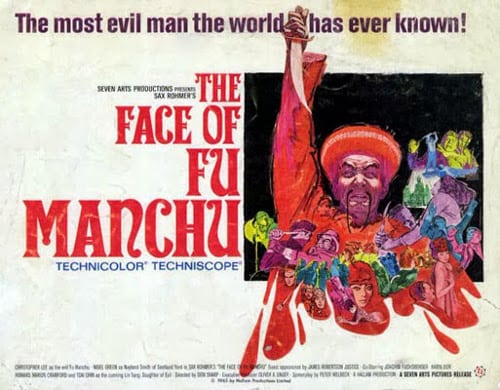
Inspector Nayland Smith helps the Chinese authorities to capture Fu Manchu and witnesses his execution. Back in England though, Smith wonders if a worldwide wave of organised crime could mean that the villain is still alive and a double was hypnotised to die in his place. Then the servant of Professor Muller is found strangled in the way that Fu Manchu’s Tibetan aides are famous for doing so, and Muller has disappeared. In fact Muller has been kidnapped by Fu and taken to his base underneath the Thames. He wants him to extract and duplicate a deadly solution from a rare Tibetan flower which could wipe out thousands….
Existing about midway between Sherlock Holmes and James Bond, The Face Of Fu Manchu probably seemed a bit quaint even in the 1960’s, and wasn’t quite the huge hit expected [which is why the sequels were much cheaper] but seen today there’s something rather appealing about its simplicity and innocence. Yes, most of the Oriental characters seem to be villainous but I don’t personally see how that’s offensive in something that is clearly intended to be a ripping yarn and nothing more [I’m not sure I can say the same for the Karloff film though!]. Our hero Nayland Smith making as many mistakes as his quarry makes for a nice balance as both hero and villain seem equally matched. The opening scene of Fu seemingly being killed is quite surprising and also has a rather dark atmosphere to it, with a lengthy high angle shot as Fu’s head is obviously being removed, then, as the titles appear, continuing to show Fu’s body lying there as it thunders and then rains. There’s also a rather chilling scene set in a seaside village where Fu has wiped out all the population, seemingly just to show that he doesn’t mess about. By comparison, it’s disappointing that Bond always stops whichever villain he’s battling just before he has a chance to do some serious damage.
Aside from some strangulations, a victim drowning in a tank and a slight hint of incest in the relationship between Fu and his just-as-evil daughter Lin Tang [played with relish by Tsai Chin [who promised 007 “very best duck” in the beginning to You Only Live Twice – and Karin Dor from that film appears too], it’s all fairly family friendly. Fu’s aides may be Thuggees [though from Tibet?!], but they seem to be easily matched by Smith and co. in the film’s several fight scenes, which aren’t too good. The funniest set-to is when Smith and another good guy battle each other for some time in a laboratory smashing everything and neither has any blood on them! Excitement level isn’t really that high – one potentially thrilling scene of Nayland and his companion Carl attacked by a plane dropping bombs finishes as soon as it’s begun – though the film’s never dull either, and it’s unusual – considering the time it was made in – that it’s all played fairly straight. Dublin doubles reasonably well for 1920’s London and, while there’s little real feel for period, it doesn’t seem to matter. Lee doesn’t seem to be trying very hard, and certainly makes no attempt to sound Chinese, but his intense calm [he never raises his voice] is still quite effective, while Nigel Green [who at one point gets to say the rather Holmes-like: “The hunt is on”!] is a fine Smith, totally unflappable but with a slight edge about him which is interesting, though I don’t know if he’s like this in the books, which I do know tend to be darker and more fantastical than the movies. This isn’t anything special but is still pretty good entertainment in its modest way.
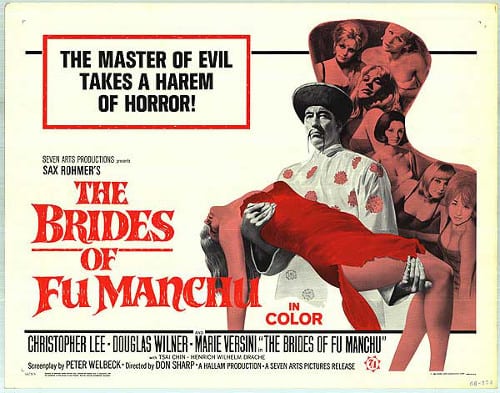
Industrialist Jules Merlin is kidnapped and taken to Fu Manchu’s new lair in the Tunisian mountains where the daughters of a number of prominent scientists, including his own, are being kept prisoner. Fu wants Merlin to help him in building wireless sets so he can wreak havoc with a death ray he has created. Nayland Smith goes on Fu’s trail again when Fu’s men try to kidnap Marie Versini, daughter of another scientist, but fail because of her boyfriend Franz Baumer. Meanwhile the hypnotised Jules, initially reluctant to aid Fu, is now in London with a wireless set near where Fu wants to cause some destruction….
I remembered this second film to be better than the first – it was certainly our most watched one out of the first three when myself and my younger brother recorded them off TV – and I suppose it is a slight improvement, though not to any great degree. The plot is simply a variant on the one in The Face Of Fu Manchu, though the telling is a little different in that we tend to be given information in advance and then watch the characters catch up. The good guys seem to constantly cock things up, while it really is bizarre that Fu continues to employ such weak henchmen. Fu gets a bit more screen time, though not a great deal, and it’s easy to be distracted by things like a Tunisian base looking Egyptian and the daughter of a German scientist [lots of German performers in these films because they were UK/West German productions] talking in a thick French accent. And the whole device of the daughters just seems like an excuse to put some scantily clad, pretty women on screen, though it’s probably hard for most male viewers to complain. Supposedly the German edit of the film [all films had a bit of re-editing and alternate footage] is the source of a famous still showing some of the girls topless, but upon viewing the German version, this is sadly not true and the picture must have just been for publicity.
A few shots of famous landmarks and one hansom cab double for 1920’s London this time and actually it’s not too bad, though this one has even less of a period feel than its predecessor largely because of its more kitschy approach, the film so obviously coming from the 1960’s. It’s even faster paced, though most of the brawling, which is a bit better staged than before, is in the first half. Except for a pretty lame final battle, director Don Sharp doesn’t seem to be hampered much by what was a considerably lower budget than before, and some sequences are staged with considerable flair, notably a kidnapping in an opera house. As before, Fu is allowed to try out his plan with catastrophic results for a few hundred people. It’s still all generally fine for kids, despite a rather intense moment where a hypnotised prisoner helps Lin Tang cause another woman to fall into a snake pit. Lee seems to be enjoying himself a bit more, and, while he doesn’t give Smith the edge and the hints of eccentricity than Nigel Green gave him, I prefer Douglas Wilmer [who gave one of the best essaying of the similar Sherlock Holmes on TV] in the role; he just seems to be more of a guy you’d trust to foil this criminal mastermind. Overall the first sequel isn’t significantly different to the original in quality, but is perhaps a little bit more fun. Both films do just about deliver within their limitations.
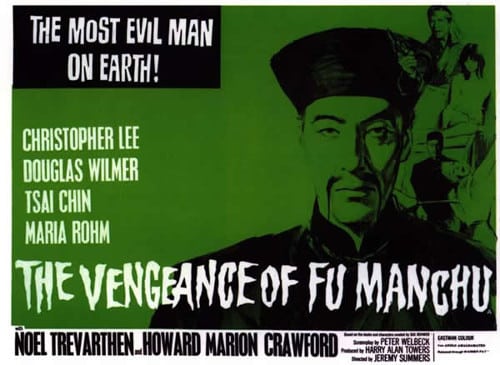
Fu Manchu and Lin Tang return to their ancestral home in China. They first create an explosion causing a rocky mountain to subside, cutting off communication between the area and Shanghai. Then they abduct plastic surgeon Dr Lieberson and his daughter and force him to create a double of Nayland Smith. Meanwhile the American Mafia ask Fu Manchu to take charge of their criminal empire. Fu Manchu quickly accepts, proposing to rid the world of its leading crime-fighters by kidnapping them and sending doubles of them to murder, get tried and executed, thereby ruining their reputations. Smith is first….
Fu Manchu was never a person to do things by half, but surely there must be less convoluted ways of killing somebody and ruining their reputation then what he does in this movie? And it’s pretty dumb of Fu to bring his most capable adversary to the heart of his operations and not kill him off there and then. In fact there are a lot of dumb things in this film. A 1930’s surgeon turning an Asian man into a [taller] Caucasian in 48 hours. A huge pile of gunpowder just sitting around waiting for the good guys to ignite it. It’s actually a shame, because this darker Fu movie had some potential. The execution and torture quota is a bit higher – Fu lets Lin execute four people in ways of her choice [including a visible if distant decapitation] right at the beginning, and somebody else later gets an iron in her back, while we even get some martial arts. The Chinese location footage is nicely shot and there’s some usage of the Shaw Brothers sets. So what happened? It’s largely down to the script by producer Harry Allan Towers [he wrote them all, under the name of Peter Welbeck]. It sidelines its hero in favour of a poorly played FBI man, and sidelines its main villain in favour of an American gangster who [for some reason – he doesn’t sound at all American] is dubbed by Robert Rietty, a man whose voice is instantly recognisable to James Bond fans as he voiced two major characters in the Sean Connery films, and his dumped girlfriend who has loads of screen time. The latter even gets to lip synch two songs for no apparent reason other than that she’s played by Towers’s wife Maria Rohm.
The dull direction by Jeremy Summers doesn’t help either and why he decided to shoot some scenes, including the operation sequence where you can honestly hear traffic and construction noises in the background from the streets outside, with live sound and not do any alterations in post production is anybody’s guess. I don’t overall think that The Vengeance Of Fu Manchu is quite as poor as most consider it to be though. While there’s less action than before, it still moves fairly swiftly, parts of the story are at least interesting, and the Smith double is quite an unsettling presence, the film almost becoming a little frightening when he’s onscreen. Howard Marion-Crawford gets more screen time than usual as the very Dr. Watson-like Dr. Petrie, and Lee’s makeup is substantially more convincing than before though the actor seems a little bored. Douglas Wilmer’s hair is now its natural grey, presumably because this film is set in the 1930’s. Malcolm Lockyear’s exciting music score might be the best one in the series. Taking out around 15 minutes or so out of this installment would improve it considerably. It has its pleasures, and on balance I’d consider it ‘average’ rather than ‘poor’.
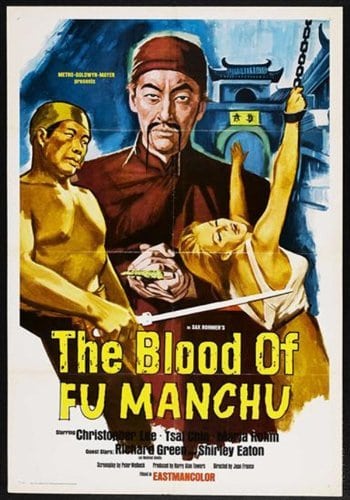
Some girls are brought blindfolded to Fu Manchu’s new lair, a lost city he’s found in the jungles of South America where he’s also discovered a snake poison which, if given to a woman, makes the woman’s kiss deadly to men. He sends one girl to London to kill Nayland Smith, but instead he’s just blinded by the poison and his friend Dr. Petrie travels with him to seek out Fu Manchu, who wants to kill all his enemies with these girls, expecting to find an antidote. There, they encounter agent Carl Jansen and bandit Sancho Lopez who rules the area….
And so we come to the two Jess Franco entries, which were shot back to back, and I was rather dreading this, which meant that at least I wasn’t disappointed. This one’s a pretty shoddy effort, though much of the blame can also be attributed to the screenplay by producer Harry Allan Towers, which is extremely messy and illogical, and it’s hard to tell if scenes like a town governor keeping Jansen prisoner for three days under false accusation because Jansen plays chess and “good chess players are hard to find”, are intended to be comical or serious. Most of Fu’s scenes are rehashes of ones in The Brides Of Fu Manchu, while a blinded Nayland Smith, whose trip to Brazil isn’t actually necessary since the antidote is available in England from the girl who gave the kiss, is inactive throughout most of the film. Instead, there’s an inordinate amount of time spent on the doings of bandit Sancho Lopez, a irritating character who actually has virtually no effect on the plot whatsoever. At one point he and his men raid a town and rape its women, but in the next scene the ladies seem really happy with these guys – but then this is Jess Franco, the director who has an obsession with women being tied/chained up and tortured. It’s pretty tame in this movie, but does uncomfortably move the series from being reasonably family friendly into sleazier waters. He’s seems more interested in, say, a woman doing a sexy dance for what seems like forever, than Fu Manchu or the plot.
As expected, there’s no sense of pace, the few action scenes are ineptly staged, and the climax suddenly appears and is then over in a couple of seconds. At one point Shirley Eaton turns up to inexplicably say to some other girls: “Release the contents of this urn” which is actually a scene taken from another Franco movie The Girl From Rio that’s just been just slung into this one. It sticks out like a sore thumb because we see shots of skyscrapers and other modern buildings in this supposedly 1920’s/30’s set adventure, but Franco isn’t the kind of filmmaker to care about things like that. As usual, the camera would rather zoom in and out of things rather than actually move. Dr. Petrie has even more screen time but likes to moan about things like cold tea, and is saddled with a very dull Smith in Richard Green. Lee, who as with Greene never left the studio, has more dialogue than before but looks uncomfortable, Tsai Chin has hardly anything to do in this one, and Towers’s wife Maria Rohm turns up again as a missionary in another largely pointless subplot except to suddenly provide Smith with a cure in the final reel. Though not totally unenjoyable, The Blood Of Fu Manchu is very lame stuff nonetheless.
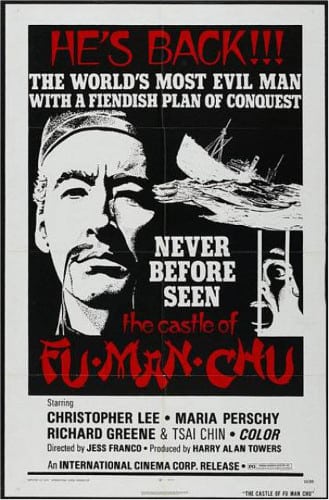
Fu Manchu causes the sinking of an ocean liner but hasn’t quite perfected his diabolical new weapon which is intended to cause oceans to freeze. Realising who’s behind the sinking, Nayland Smith is certain that Fu will attempt to set up operations in Istanbul because of its easy access to The Bosphorus, and heads for there. Opium being needed to power his machine, Fu enlists the help of local opium king Omar Pasha and captures Anatolia Castle, then abducts Professor A.G. Heracles, whom he needs to complete the freezing process. However, Heracles has a bad heart and so Fu also abducts Dr Curt Kessler to perform a heart transplant from a perfectly healthy living donor….
Producer Harry Allan Towers told director Jess Franco that he’d: “Managed to kill off Fu Manchu, something no one else has been able to do” after first screening this movie, but that’s not entirely fair considering that he wrote the dire screenplay to this turkey. It’s a screenplay which has its villain make demands for a ransom but neglect to mention what he actually wants in return for not destroying the world. It’s a screenplay which tells us that Fu can’t complete his weapon and needs the help of a scientist but when the scientist refuses to give him the formula Fu doesn’t bother to torture him for it and just goes ahead anyway. A screenplay which doesn’t even tell us how Nayland Smith destroys Fu’s castle, unless they ran out of money. They certainly had no money for special effects so – rather than have events occur off screen – they pinched footage from A Night To Remember [a film made in black and white, you remember, and – no Jess – having the footage tinted blue doesn’t fool anyone] and the less known Campbell’s Kingdom [though you may recognise Dirk Bogarde and Stanley Baker] for its main set pieces. The opening scene inter-cuts shots from the Titanic movie with shots from The Brides Of Fu Manchu and I almost felt like giving up on the film there and then!
Sadly, though I thought I was in for a bad movie of the unintentionally hilarious kind, the rest is quite dull until the final reel, Franco commendably restraining himself from his usual sleaze but making no attempt whatsoever to make the storyline exciting and not caring if the shadows of the camera crew are visible, though he does try harder to give this one some more style, from an operation sequence comprising almost entirely of close-ups of hands, faces and a clock ticking, to the caverns below the castle being full of green and pink lighting. Unfortunately his love of the zoom lens just gets out of control and it almost feels as if the camera is on a side-ways trampoline. It seems that the only attempts to set this film in the 1920s/30’s are shots of two vintage cars, but seeing that Fu’s hair is now suddenly greying maybe it’s intended to be set much later….though considering that this is a film which is so sloppy that it calls one character a different name to what people actually call her in the film, I doubt it. At least Lin Tang is given slightly more to do, though even Tsai Chin – along with Christopher Lee and Howard Marion-Crawford the only performer to be in all five films – seems uninterested. Franco is a filmmaker with a strong cult following, but having seen five of his movies I’m not convinced he’s any more than a hack with a few pretensions to style which are undermined by his overall incompetence. As for this five-film series [a sixth was planned then understandably cancelled], the first three are worth checking out as long as you don’t expect too much, but I would advise that you avoid the last two unless you’re really feeling masochistic. At the end of these films Fu says: “The world shall hear from me again”, but fortunately it was a lie this time.

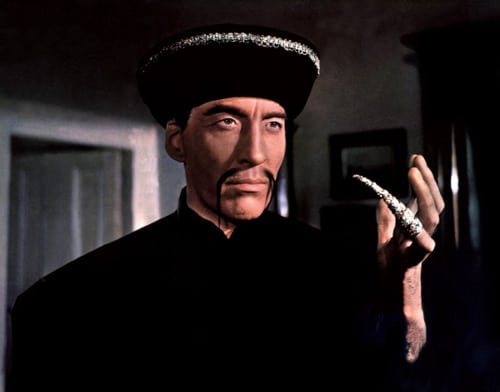




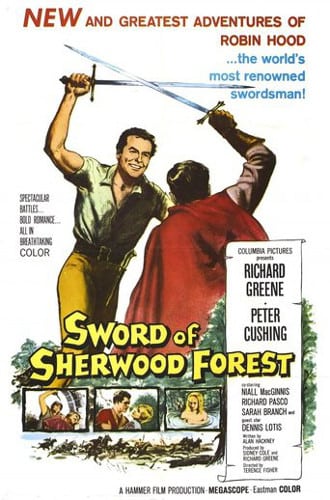
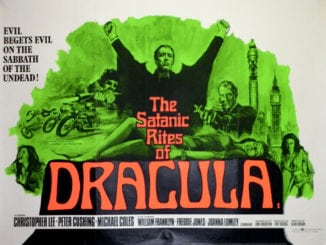
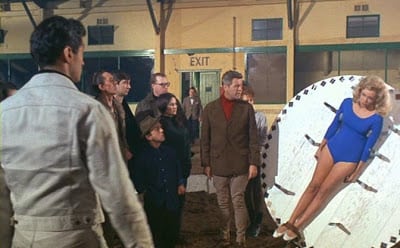
Be the first to comment